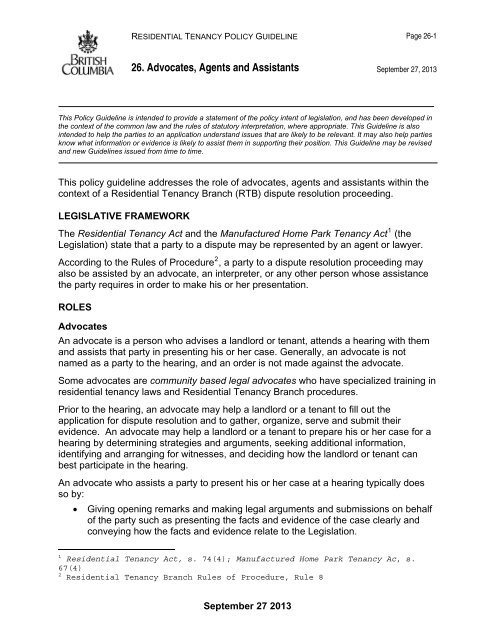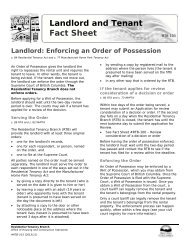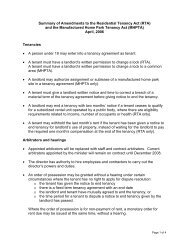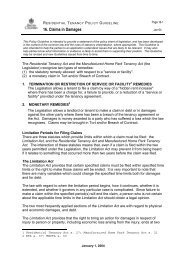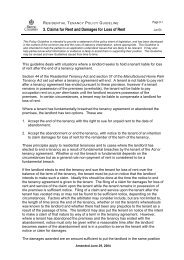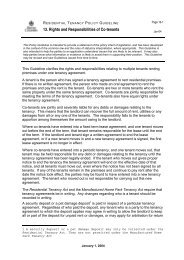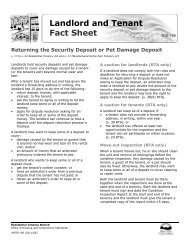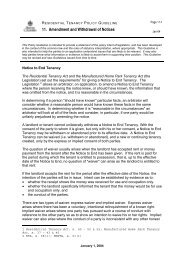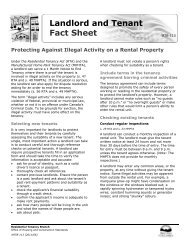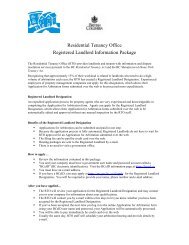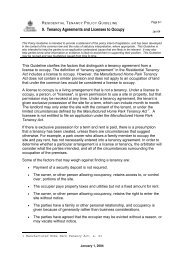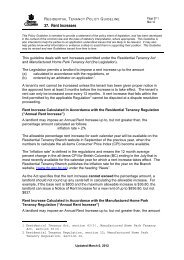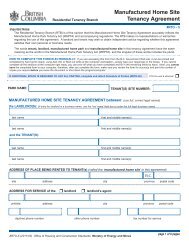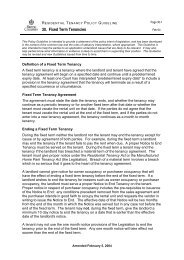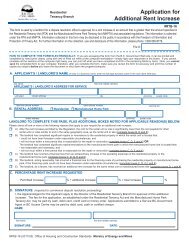Agents - Residential Tenancy Office
Agents - Residential Tenancy Office
Agents - Residential Tenancy Office
You also want an ePaper? Increase the reach of your titles
YUMPU automatically turns print PDFs into web optimized ePapers that Google loves.
RESIDENTIAL TENANCY POLICY GUIDELINE<br />
Page 26-1<br />
26. Advocates, <strong>Agents</strong> and Assistants<br />
September 27, 2013<br />
This Policy Guideline is intended to provide a statement of the policy intent of legislation, and has been developed in<br />
the context of the common law and the rules of statutory interpretation, where appropriate. This Guideline is also<br />
intended to help the parties to an application understand issues that are likely to be relevant. It may also help parties<br />
know what information or evidence is likely to assist them in supporting their position. This Guideline may be revised<br />
and new Guidelines issued from time to time.<br />
This policy guideline addresses the role of advocates, agents and assistants within the<br />
context of a <strong>Residential</strong> <strong>Tenancy</strong> Branch (RTB) dispute resolution proceeding.<br />
LEGISLATIVE FRAMEWORK<br />
The <strong>Residential</strong> <strong>Tenancy</strong> Act and the Manufactured Home Park <strong>Tenancy</strong> Act 1 (the<br />
Legislation) state that a party to a dispute may be represented by an agent or lawyer.<br />
According to the Rules of Procedure 2 , a party to a dispute resolution proceeding may<br />
also be assisted by an advocate, an interpreter, or any other person whose assistance<br />
the party requires in order to make his or her presentation.<br />
ROLES<br />
Advocates<br />
An advocate is a person who advises a landlord or tenant, attends a hearing with them<br />
and assists that party in presenting his or her case. Generally, an advocate is not<br />
named as a party to the hearing, and an order is not made against the advocate.<br />
Some advocates are community based legal advocates who have specialized training in<br />
residential tenancy laws and <strong>Residential</strong> <strong>Tenancy</strong> Branch procedures.<br />
Prior to the hearing, an advocate may help a landlord or a tenant to fill out the<br />
application for dispute resolution and to gather, organize, serve and submit their<br />
evidence. An advocate may help a landlord or a tenant to prepare his or her case for a<br />
hearing by determining strategies and arguments, seeking additional information,<br />
identifying and arranging for witnesses, and deciding how the landlord or tenant can<br />
best participate in the hearing.<br />
An advocate who assists a party to present his or her case at a hearing typically does<br />
so by:<br />
• Giving opening remarks and making legal arguments and submissions on behalf<br />
of the party such as presenting the facts and evidence of the case clearly and<br />
conveying how the facts and evidence relate to the Legislation.<br />
1 <strong>Residential</strong> <strong>Tenancy</strong> Act, s. 74(4); Manufactured Home Park <strong>Tenancy</strong> Ac, s.<br />
67(4)<br />
2 <strong>Residential</strong> <strong>Tenancy</strong> Branch Rules of Procedure, Rule 8<br />
September 27 2013
RESIDENTIAL TENANCY POLICY GUIDELINE<br />
Page 26-2<br />
26. Advocates, <strong>Agents</strong> and Assistants<br />
September 27, 2013<br />
• Guiding the party through his or her evidence. This may be done through asking<br />
questions of the party and assisting the party to present his or her oral evidence<br />
and explain his or her documentary evidence.<br />
• Asking questions of the party’s witnesses for the purpose of presenting evidence.<br />
• Asking questions of the other party and their witnesses with respect to their<br />
evidence.<br />
At times an advocate may attend a hearing in place of a party. The advocate may be<br />
required to provide written verification that they have authority to do so. Written<br />
verification is not required where an advocate is attending with a party.<br />
<strong>Agents</strong><br />
An agent acts on behalf of a landlord or tenant, speaks on behalf of, and often appears<br />
on behalf of the party. An agent may also be a person who has acted for a party during<br />
the course of a tenancy, such as a property manager who acts on behalf of a landlord,<br />
and as such may have evidence to present at the hearing. A tenant may appoint any<br />
trusted person as their agent. Where a party chooses to attend the hearing, they are<br />
entitled to remain with their agent throughout.<br />
Unlike advocates, agents have full authority to settle the claims and may be named as a<br />
party to the dispute.<br />
An agent may:<br />
• Apply for dispute resolution on behalf of the landlord or tenant 3<br />
• Prepare, organize, serve and submit evidence<br />
• Make submissions on behalf of the party<br />
• Ask questions of the other party and witnesses with respect to their evidence<br />
• Settle claims<br />
<strong>Agents</strong> may be required to provide written verification that they have been appointed by<br />
the landlord or tenant to act or appear on their behalf at the dispute resolution<br />
proceeding and that they have full authority to settle a claim. This is particularly<br />
important when the agent has not had direct involvement during the tenancy. Written<br />
verification is not required where a party attends the hearing with his or her agent.<br />
3 When an agent applies for dispute resolution on behalf of a landlord or<br />
tenant, such as a property manager applying for an Order of Possession<br />
through the Direct Request process, the agent should attach a letter to the<br />
application explaining their role and authority to act.<br />
September 27 2013
RESIDENTIAL TENANCY POLICY GUIDELINE<br />
Page 26-3<br />
26. Advocates, <strong>Agents</strong> and Assistants<br />
September 27, 2013<br />
Assistants<br />
An assistant may include a translator, interpreter, helper or family member who helps a<br />
party with the dispute resolution proceeding. An assistant may help a landlord or tenant<br />
fill out an application for dispute resolution, but does not sign on their behalf. An<br />
assistant may provide translation services, interpreting the proceedings into another<br />
language or for persons who are hard of hearing or have disabilities. In addition, an<br />
assistant may help a landlord or tenant understand what’s going on in the dispute<br />
resolution hearing.<br />
When an assistant speaks at a hearing, it is not on behalf of the landlord or tenant.<br />
Rather, the assistant repeats the proceedings in a way that the party can understand<br />
them, or repeats the statements of the party in a way that other participants in the<br />
hearing can understand. An assistant does not offer new, independent or additional<br />
information.<br />
ADVOCATES, AGENTS AND ASSISTANTS APPEARING AS WITNESSES<br />
In some circumstances, an advocate, agent or assistant may need to give testimony as<br />
a witness. A party represented by an agent or advocate may also appear as a witness.<br />
Generally, anyone appearing in a hearing as a witness is not permitted to listen to the<br />
proceedings before or after giving their evidence. However, in this circumstance an<br />
exception may be made. Whenever possible, they should be called before other<br />
witnesses so that their evidence is not influenced by other testimony.<br />
September 27 2013


